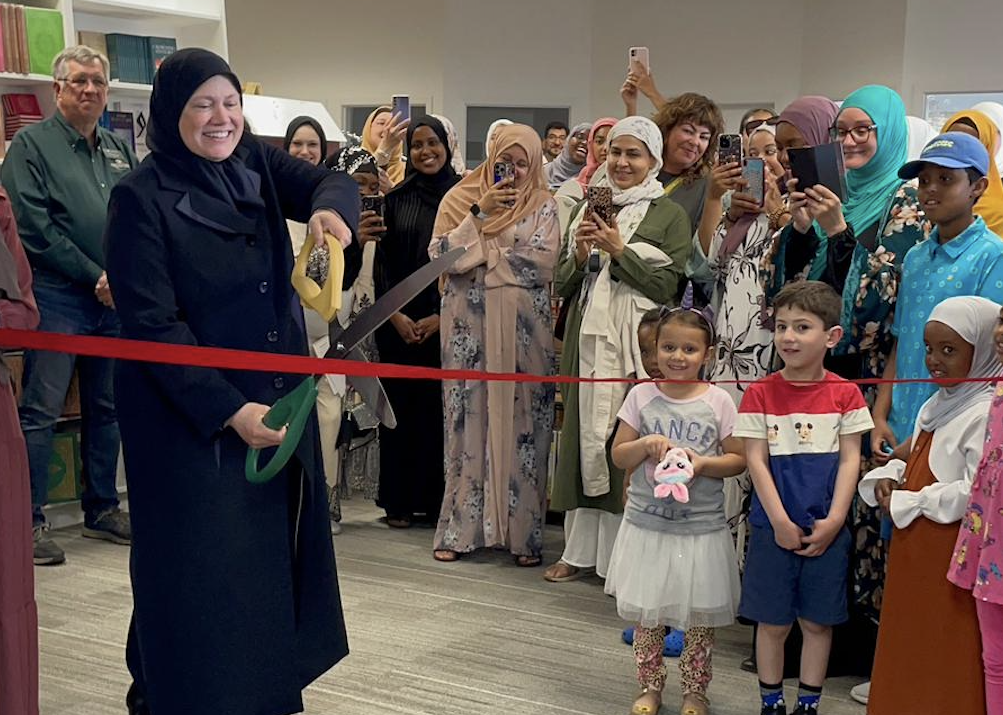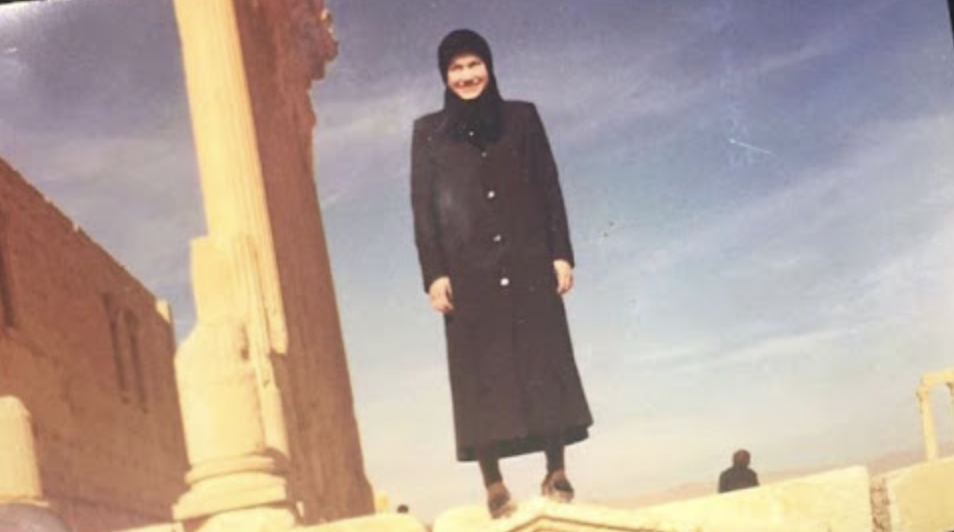Living a Muslim Life
By Tayyaba Syed
Nov/Dec 2024

January 2025 marks a special milestone: 40 years since Shaykha Tamara Gray accepted Islam. Dr. Gray, EdD is the founder, executive director, and chief spiritual officer at Rabata. Spending time reflecting as the big day approaches, she feels that it’ll be a full-circle moment for her. As a new Muslim in the mid-1980s, she searched and yearned for ways to learn about Islam.
“To be a Muslim woman at that time was a frustrating experience,” recalls Gray, who grew up in Minnesota and returned there in 2012, after her studies and work in Damascus, Syria. “In the ’80s, we didn’t have access to learning. The books written about Islam or Muslim women used English that was riddled with rough language and mistranslations, or the tone was derogatory. Going to the mosque was frustrating too. You didn’t feel like part of the community. Converts really struggle with culture, and I experienced that in those early years.”
She remembers the day very clearly, standing at the corner of Grand and Snelling Avenues in St. Paul and pleading with God to send her the people and community she needed to both sustain and grow her faith. She didn’t know how much longer she could do this on her own.
Moving to Syria
Her supplication was answered shortly thereafter – she met a woman who had studied in Syria and was willing to teach her. In one week, she had scripted 100+ pages of notes on Islamic subjects like fiqh, sirah, and tazkiya (purification of the soul). This inspired her to pursue further studies in Syria under the tutelage of more women like her first teacher.
“I met women there who had memorized the Quran, mastered the ten qiraat (methods of recitation), received certification in the books of hadith and were serious yet joyful about their faith,” she shares.
“They had deep daily worship, were continuous learners who taught what they learned to their communities, held professional titles/careers, and simultaneously had a healthy family life. People we would call [them] ‘superwomen,’ but they are embodying the example of the Companions …
“This is the true culture of Islam, and I am grateful to have met them and witnessed what we can be for Allah in this life. Yes, we can stretch ourselves with the abilities and blessings Allah has given us. My initial intent was to save my faith and not lose it; it quickly changed to wanting to share it with whomever I could.”

Over the next few decades, Gray did just that by advancing in her Islamic and secular studies and excelling professionally. She holds a doctorate in leadership (University of St. Thomas, ’19), a master’s degree in curriculum theory and instruction (Temple University, ’91), and has spent 20 years studying traditional and classical Islamic sciences, Quran, and Arabic in Damascus. She also worked in education for 25 years before moving into the nonprofit world.
In 2012, Gray took a temporary leave from her job and returned to the U.S. with the intention of only being away for five months (from the civil war). While she was here, some of her students arranged a tour for her to meet with North American Muslim women. In one month, she gave almost 70 talks and met hundreds of them. However, she noticed something concerning: Many of them were facing great struggles, especially with faith.
“It was like nothing had changed in the 20 years I was away,” Gray notes. “These women wanted to go to jannah but were dealing with bitterness and ignorance on how to practice their faith.”
Rabata is Born
That fall, she offered a pilot course on the Companions. Over 150 women registered for this life-changing online class. This quickly led to the inception of Rabata’s educational program Ribaat, which now offers 125 courses with 2,000+ students per semester worldwide. Rabata’s mission is to create positive cultural change through creative educational experiences for women, teenaged girls, and children.
“It is women who carry forth culture, and a lot of what we do and offer at Rabata is what I needed when I started on this path to Allah,” says Gray. “When I came back to the U.S., I met so many women (nonverts and converts) with that same need. Rabata may just be the result of someone’s answered du‘a like Damascus was for me. I wanted to bring what I gained there and share it with women here through Rabata: give it forth and give it out.
“As I have been doing final assessments with our most recent graduates [41 to date], they keep sharing how grateful they are. When we say we are trying to ‘create positive cultural change,’ that penetrates women’s personal lives through confidence in their faith. They tell me thanks to Rabata, they are working differently in their communities now and raising their families better.”
Gray believes that when you are a Muslim woman, you’re not talking about Islam, but living a Muslim life. According to her, we should be magnets for people to come to Allah and bring goodness wherever we are, which requires us to be intentional in everything we do and have an akhira perspective.
In June 2023, Rabata received the two-year Healthy Connections and Social Impact grant from the Blue Cross and Blue Shield of Minnesota Foundation. This opportunity provides Rabata the support to curate intergenerational programming for the state’s Muslim women to be connected to one another to reduce social isolation and, in turn, lead healthier lives.
“We had to think outside the box,” she shares, “and get even more creative in bringing about this positive cultural change.” Rabata has organized sports and physical activities like boxing, skiing, golf, Pilates, and yoga in a safe and healthy communal environment. The yoga classes even drew an intergenerational group of women and girls to Rabata’s headquarters and cultural center (RCC) in Arden Hills, Minn., every week.
They also initiated a financial literacy program, as many local Muslim women expressed interest in learning how to manage finances compatible with their unique lifestyles and cultural choices. Rabata helped address their feelings of being alone and uninformed regarding money matters.
Not only are women bettering themselves through such educational experiences, but they are also finding community in-person and online. Rabata provided a virtual learning and spiritual platform many years before Covid-19 hit. However, during the pandemic they opened Masjid Rabata for women to gather online to worship and be together in a safe, digital space. In 2023 alone, this online masjid held 200+ gatherings; 21,000+ attendees globally throughout the year.
“Living in Syria meant I was not online,” says Gray. “Therefore, I am not a digital native but a digital immigrant. Online teaching was so new to me, but I believed in the idea that being together virtually is still within ‘Allah’s space,’ where we can exchange knowledge, emotions, and our state of being. It is not the same as watching a video, but [is] actually ‘sitting together’ even if we are physically apart. Digital time is real time, through which we can still bring real benefit and value to our lives.”
Considering this, Gray is the resident scholar for the Ribaat Academic Institute, teaching multiple classes online and in-person. Aside from Rabata, she is also a faculty member at The Islamic Seminary of America, serves on the board of the Fiqh Council of North America, writes academic articles as a senior fellow at the Yaqeen Institute, and has authored her award-winning book “Joy Jots” (Daybreak Press, 2014) — a collection of 52 weekly essays that take the reader through a year of seasons. She has also helped translate the late Syrian scholar Dr. Samira al-Zayid’s “A Compendium of the Sources on the Prophetic Narrative” (Daybreak Press, 2018).
Balancing it All
Among the pushbacks she has received since moving back to the U.S. is that she is “doing too much.” Aside from diligently doing the work of deen, she is married: three adult children, two grandchildren, and nearby parents and siblings. When asked how she balances everything, she mentions that it’s more about continuously recentering ourselves around God rather than trying to balance it all.
“Every week I ask myself what the big goals are that I want to reach this week,” she shares. “What am I working towards? It’s not just thinking about work but my whole life. How am I making time for my family? I like to be at my granddaughter’s soccer games and will move my schedule around if need be. It is all about improving relationships, continuing to grow and developing ourselves for Allah.”
In an era where Muslim women struggle to be recognized for their scholarship, qualifications, and seniority in Muslim spaces, it’s refreshing to find Shaykha Tamara Gray is remaining steadfast in her vision of creating a rising tide of female Muslim scholars, teachers, and community stewards in every digital and local neighborhood in the world.
Tayyaba Syed is a multiple award-winning author, journalist, and Islamic studies teacher. She conducts literary and faith-based presentations for all ages, serves on Rabata’s board of directors, and is an elected member of her local school district’s board of education in Illinois, where she lives with her husband and three children.

